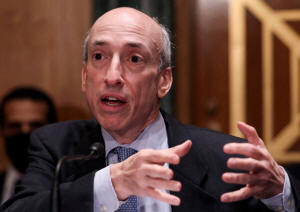U.S. SEC proposes changes to whistleblower program to capture more
tipsters
 Send a link to a friend
Send a link to a friend
 [February 11, 2022]
By Katanga Johnson [February 11, 2022]
By Katanga Johnson
WASHINGTON (Reuters) - The U.S. Securities
and Exchange Commission on Thursday proposed changing the rules of its
whistleblower program to make it easier for tipsters to claim bounties.
The changes, which are subject to public consultation, would scrap a
Trump-era rule that had afforded the agency greater discretion to
determine the size of whistleblower payouts.
Critics said that Trump rule deterred whistleblowers since it gave the
SEC the discretion in some instances to lower awards.
The new proposal guarantees that the SEC would consider the dollar
amount of a potential award for the "limited purpose" of increasing
rather than lowering it.
It would also make it easier for tipsters to claim awards when their
information leads to a successful enforcement action brought by other
federal agencies, known under the program as a 'related action.'
SEC Chair Gary Gensler said in a statement that the changes aim to
ensure whistleblowers are both incentivized and appropriately rewarded
for their efforts in reporting potential violations of the law to the
agency.

[to top of second column]
|

U.S. Securities and Exchange Commission (SEC) Chair Gary Gensler
testifies before a Senate Banking, Housing, and Urban Affairs
Committee oversight hearing on the SEC on Capitol Hill in
Washington, U.S., September 14, 2021. REUTERS/Evelyn Hockstein/Pool

The SEC's whistleblower program was created by Congress after the
2007-2009 global financial crisis and receives thousands of tips
annually.
Currently, the SEC can reward tipsters whose original information leads
to a penalty exceeding $1 million with rewards of between 10% and 30% of
the fine.
The SEC may also pay a reward in a related enforcement action brought by
certain other agencies, provided that settlement was based on the same
information the tipster originally gave to the SEC.
The proposed changes to the related action rule would afford tipsters
more choice to decide whether to receive an award from the SEC or the
authority administering the other award program.
The whistleblower would not be required to select which program to
receive the award from until both programs had determined the award
amount they would pay.
(Reporting by Katanga Johnson in Washington, Editing by William Maclean)
[© 2022 Thomson Reuters. All rights
reserved.] This material may not be published,
broadcast, rewritten or redistributed.
Thompson Reuters is solely responsible for this content. |